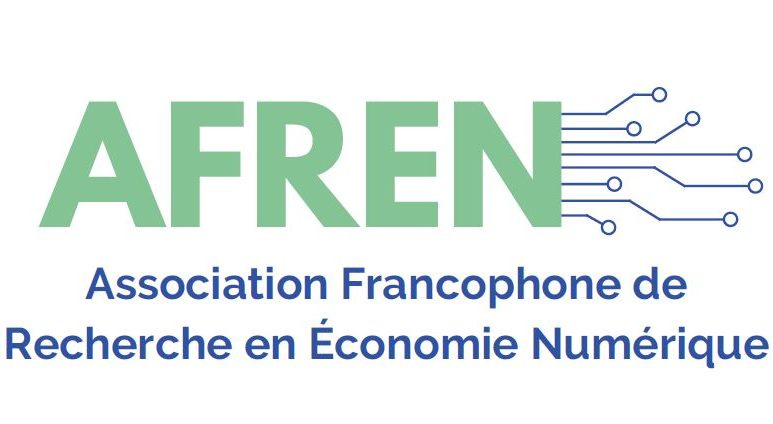L’école du numérique 2016 a eu lieu à Nice les 30 et 31 Mai sur le Campus de St Jean d’Angely à l’université Nice-Sophia Antipolis.
Programme :
Session 1 : Digital platforms and competition
- Medhi FARAJALLAH, Bob HAMMOND, Thierry PENARD, “What Drives Pricing Behavior in Peer-to-Peer Markets? Evidence from the Car-Sharing Platform BlaBlaCar”
- Marc BOURREAU, Bernard CAILLAUD, Romain DE NIJS, “Taxation of a Monopolist Digital Platform”
- Germain GAUDIN, Alexander WHITE, “On the Antitrust economics of the electronic books industry“
Session 2 : Digital networks
- Maude HASBI, “Private Operators’ Entry Strategies in the FttH Market – The Case of France”
- Raphaël SUIRE, « Contournement, déconnexion, aliénation : les nouvelles figures de la fracture numérique »
- Adel BEN YOUSSEF, Leila BEN-AOUN PELLETIER, “Does Internet Speed Matters?”
Session 3. Crowdfunding 1
- Irina LYUBAREVA, Fabrice ROCHELANDET, « Le crowdfunding au secours de la presse…ou pas »
- Sylvain DEJEAN, « Géographie et Crowdfunding »
- Sophie POMMET, Alexandra RUFINI, Dominique TORRE, “Crowdfunding and social networks”
Session 4 : Mobile payment
- Yann BALGOBIN, David BOUNIE, Martin QUINN, Patrick WAELBROECH, “Payment instruments, financial privacy and online purchase”
- Mamourou SIDI KONATE, Dominique TORRE, “Mobile Payment, Microfinance, and the optimal level of Informal Sector in developing countries”
- Maëlle DELLA PERUTA, “Mobile money adoption and financial inclusion objective: macroeconomic approach through cluster analysis”
Session 5 : Network, investment and entry
- Thomas LE TEXIER, Thierry PENARD, “Access quality in two-sided platform: the role of integration”,
- Jean-Marc ZOGHEIB, “Merger control and entry incentives: the case of cross-border mergers”
Session 6 : Privacy concerns
- Grazia CECERE, Fabrice LE GUEL, Nessrine OMRANI, “Why individuals do not read privacy?”
- Nicolas SOULIE, Nessrine OMRANI, « L’impact de la culture sur la conception et les inquiétudes en matière de vie privée en ligne »
- Grazia CECERE, Fabrice LE GUEL, Mathieu MANANT, “Giving up your privacy for free services: are you comfortable with it?”
- Amel ATTOUR, Nathalie DUBUS, “A cross country analysis of privacy concerns and trust in intelligent transport system”
Session 7 : Consumers’ behaviour
- Marlene LE KIM, Julien PENIN, “The role of online communities and cultural middlegrounds in creativity: the case of alternative pornography“
- Nestor DUCH-BROWN, Lukasz GRZYBOWSKI, Frank VERBOVEU, “The impact of online sales on consumers and firms- Evidence from household appliances”
- Adnane KENDEL, Nathalie LAZARIC, Kevin MARECHAL, “Learning by looking in energy field : Results from a consumer field in Southern France“
Session 8 : Crowdfunding 2
- Jordana VIOTTO, “Beyond financing: crowdfunding as an informational mechanism”
- Grazia CECERE, Frédéric MAHE, Fabrice ROCHELANDET “Cutting the cord? An empirical examination for information sources in crowdfunding”
- Jonathan SITRUK, “Categorization and success of crowdfunding projects”
Session 9 : Patents, competition and contacts
- Marc BOURREAU, Rafael C. de M. FERRAZ, Yann MENIERE “Licensing Standard Essential Patents with Costly Enforcement”
- Arrah-Marie JO, « L’intensité de la concurrence et la cybersécurité »
- Ambre NICOLLE, “Cognitive limitations or risk aversion? Tariff choice and consumption of cellular data”
Session 10. Digital innovation, big data and capabilities
- Eric DARMON, Nicolas POUSSING, Thomas LE TEXIER, « PME, webmarketing et “big data” »
- Samy GUESMI, « Trajectoires d’adoption et d’appropriation du web 2.0 dans les systèmes d’information organisationnels »
- Rémy GUICHARDAZ, “Music Industry intermediation in the digital era, the resilience of the music majors oligopoly: the role of transactional capabilities in a dynamic model”
Session 11. ICT, innovation and business models
- François DELTOUR, Sébastien LE GALL, Virginie LETHIAIS, “Do ICTs facilitate the mobilization of resources for innovation: the case of small and medium firms”
- Thierry RAYNA, Ludmila STRIUKOVA, « Dynamiques d’adoption et de diffusion des technologies d’impression 3D : quels impacts sur les modèles d’affaires ? »

